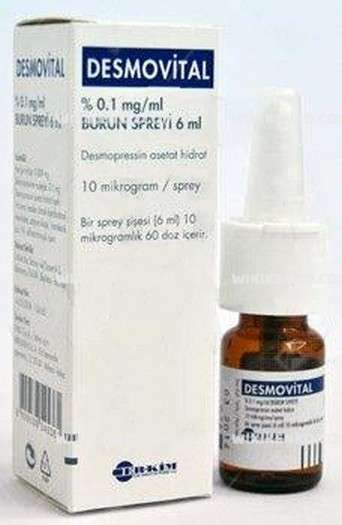Desmovital Nose Spray
Desmovital Nose Spray is a therapeutic marvel designed to address Central Diabetes Insipidus, a condition characterized by excessive thirst and the production of copious amounts of diluted urine. In this informative guide, we delve into the intricacies of Desmovital, its uses, dosage, precautions, and more.
| Dosage form | |
|---|---|
| Pack size | |
| Potency | %0.01 6Ml |
| Manufacturer | |
| Origin | |
| Generic Name (Ingredient) | Desmopressin Acetate Hydrate (Ddavp) 0.600 Mg (Equivalent To 0.534 Mg Desmopressin) 10 Micrograms Of Dose Per Dose |
Assuming your emergency circumstances for this product, visit Urgent Quotation page. Besides, for any pharmaceutical questions, please ask us in the comments section.
Description
Desmovital is a nasal spray housing the potent active ingredient, Desmopressin Acetate Hydrate, also known as DDAVP. Each 6 mL bottle delivers 0.600 mg of this vital compound, equivalent to 0.534 mg of Desmopressin.
Application and Usage
Desmovital finds its primary purpose in treating Central Diabetes Insipidus, a condition distinct from Diabetes Mellitus (commonly known as sugar diabetes). Central Diabetes Insipidus is marked by intense thirst and the excretion of diluted urine.
Furthermore, Desmovital plays a pivotal role in assessing kidney functionality, particularly their ability to concentrate urine effectively.
Administration and Dosage
The administration of Desmovital is through the nasal route. However, the precise dosage and frequency of usage should be determined by a healthcare professional. These factors are influenced by the patient’s unique medical condition and response to treatment.
Before the initial use of the spray, priming is essential. This involves pressing the pump down a few times to ensure proper functionality. The user should then gently clear their nasal passages before employing the spray. The application process entails tilting the head back slightly and inserting the nose piece’s tip into the nostril. After releasing a single spray and simultaneously inhaling gently, the user should hold their breath for a few seconds before exhaling slowly through their mouth.
Side Effects
Desmovital, with Desmopressin as its active component, may yield certain common side effects. These may include:
- Stuffy nose
- Runny nose
- Sinus pain
- Sneezing
- Nosebleeds
- Discomfort in the nose
- Sore throat
- Cough
- Dizziness
- Increased blood pressure
- Nausea
- Stomach cramps
- Headache
- Back pain
- Flushing (warmth, redness, or tingly feeling)
It’s crucial to acknowledge that the occurrence of these side effects can vary from person to person. If any of these symptoms manifest, consulting with a healthcare provider is recommended.
Desmovital Precautions
While Desmovital serves as a valuable tool in treating Central Diabetes Insipidus, several precautions should be heeded. It is advisable not to use Desmovital if you have:
- A serious heart condition
- An unusually high fluid intake, including alcohol consumption
- Taken other medications unknown to your healthcare provider, including over-the-counter cold remedies
- Chronic or psychogenic polydipsia (abnormally high fluid intake resulting in excessive urine production)
- Moderate to severe kidney insufficiency
- Syndrome of Inappropriate Antidiuretic Hormone Secretion (SIADH)
- Known hyponatremia (decreased sodium levels in the blood)
- An oversensitivity to Desmopressin or any auxiliary substances
Before initiating any new medication, it is imperative to consult with a healthcare professional. Always adhere to your doctor’s prescribed dosage and usage instructions.
Pregnancy Considerations
Desmovital nasal spray, containing Desmopressin as the active ingredient, is not intended for the treatment of excessive urination, a normal pregnancy condition. Its use during pregnancy may not be safe, and consulting a healthcare professional is essential before considering any medication.
Breastfeeding
The safety of using Desmovital while breastfeeding has not been established. As with pregnancy, it is crucial to seek guidance from a healthcare provider when contemplating any new medication during the breastfeeding phase.
Prescription
Desmovital nasal spray, with Desmopressin as its active component, is a prescription medication. This underscores the necessity for its use under healthcare professional supervision. Typically, it is not available for purchase without a prescription.
Natural Remedies for Central Diabetes Insipidus
While Desmovital addresses Central Diabetes Insipidus effectively, some individuals explore natural remedies to complement their treatment. These remedies may include:
- Bitter Melon (Momordica charantia): Known for its anti-diabetic properties, bitter melon helps control blood glucose levels. It can be consumed as juice or prepared as a vegetable.
- Tomatoes: Rich in lycopene, tomatoes offer protection against cancer and heart issues. They possess a low glycemic index, making them suitable for diabetic patients.
- Fenugreek (Trigonella foenum-graecum): With diuretic properties, fenugreek can aid in lowering blood glucose levels. Both the leaves and seeds of fenugreek can be utilized.
- Guava: Abundant in essential vitamins and potassium, guava helps regulate high blood pressure in diabetic patients.
- Phosphoric Acid: Considered when individuals with diabetes insipidus experience symptoms like nervousness, anxiety, worry, and grief.
- Homeopathic Remedies: Specific homeopathic remedies, such as Argentum nitricum and Eupatorium perfoliatum, may offer assistance.
It is vital to recognize that while these natural remedies may manage symptoms, they do not substitute medical treatment. Always consult with a healthcare professional before implementing new treatments.
Conclusion
In conclusion, Desmovital Nose Spray, with its active ingredient Desmopressin, stands as a cornerstone in the management of Central Diabetes Insipidus. Its effectiveness, coupled with the guidance of healthcare professionals, empowers individuals to navigate this condition successfully. Remember that consulting with a healthcare provider is paramount when making decisions regarding medications and natural remedies. In the realm of Central Diabetes Insipidus, knowledge and prudent choices lead to enhanced well-being.
| Aspect | Details |
|---|---|
| Active Ingredient | Desmopressin Acetate Hydrate (DDAVP) |
| Purpose | Treatment of Central Diabetes Insipidus, Kidney Function Assessment |
| Administration Method | Nasal Spray |
| Side Effects | Stuffy Nose, Runny Nose, Sinus Pain, Sneezing, Nosebleeds, Discomfort in Nose, Sore Throat, Cough, Dizziness, Increased Blood Pressure, Nausea, Stomach Cramps, Headache, Back Pain, Flushing |
| Precautions | Serious Heart Condition, High Fluid Intake (including alcohol), Unknown Medications, Polydipsia, Kidney Insufficiency, SIADH, Hyponatremia, Hypersensitivity |
| Pregnancy Consideration | Consult Healthcare Professional |
| Breastfeeding Consideration | Consult Healthcare Professional |
| Prescription Status | Prescription Medication |
| Natural Remedies for Management | Bitter Melon, Tomatoes, Fenugreek, Guava, Phosphoric Acid, Homeopathic Remedies |
Use the form below to report an error
Please answer the questions as thoroughly and accurately as possible. Your answers will help us better understand what kind of mistakes happen, why and where they happen, and in the end the purpose is to build a better archive to guide researchers and professionals around the world.
The information on this page is not intended to be a substitute for professional medical advice, diagnosis, or treatment. always seek the advice for your physician or another qualified health provider with any questions you may have regarding a medical condition. Always remember to
- Ask your own doctor for medical advice.
- Names, brands, and dosage may differ between countries.
- When not feeling well, or experiencing side effects always contact your own doctor.
Cyberchondria
The truth is that when we’re sick, or worried about getting sick, the internet won’t help.
According to Wikipedia, cyberchondria is a mental disorder consisting in the desire to independently make a diagnosis based on the symptoms of diseases described on Internet sites.
Why you can't look for symptoms on the Internet
If diagnoses could be made simply from a textbook or an article on a website, we would all be doctors and treat ourselves. Nothing can replace the experience and knowledge of specially trained people. As in any field, in medicine there are unscrupulous specialists, differences of opinion, inaccurate diagnoses and incorrect test results.




Reviews
There are no reviews yet.